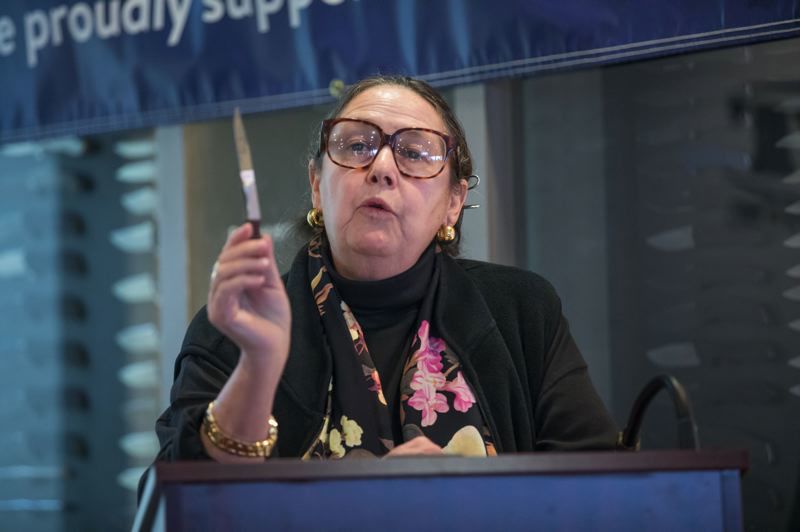State Sen. Betsy Johnson running for governor – but not as a Democrat
Published 2:08 pm Thursday, October 14, 2021

- PAMPLIN MEDIA GROUP FILE PHOTO - State Sen. Betsy Johnson of Scappoose
Sen. Betsy Johnson, a moderate Democrat from Scappoose, announced Thursday she is running for governor in 2022 – with no party affiliation.
Johnson, a member of the Oregon Legislature since 2001, said in an email announcement that she wanted to be a centrist option between the extremes of a “left-wing liberal” and a “right-wing Trump apologist.”
“Oregonians are ready to move to the middle where sensible solutions are found,” Johnson said.
The governor’s office will be open in 2022 as Gov. Kate Brown, a Democrat, is barred from running due to term limits.
Johnson would bypass the May primary and go directly on the November general election ballot by submitting 23,744 valid signatures. Because signatures can turn out to be invalid for a number of reasons, most successful campaigns aim for a buffer of at least 25% more than needed.
If successful, Johnson would face the winners of the major party primaries.
Top state Democrats who have announced they are running for governor include House Speaker Tina Kotek of Portland, and Treasurer Tobias Read. Yamhill County Commissioner Casey Kulla and former unaffiliated Party candidate for governor Patrick Starnes of Brownsville are also seeking the Democratic nomination.
Johnson’s announcement came on the same day the New York Times reported columnist Nicholas Kristof had resigned from the newspaper to focus on his decision whether to run as a Democrat for governor in Oregon.
A native of Yamhill County, Kristof has not formally announced his bid, but took a key step Tuesday when he registered a campaign finance committee with the Oregon Secretary of State that would allow him to raise and spend funds.
No Republican has been elected governor of Oregon since Vic Atiyeh won a second term in 1982.
Several Republicans are lining up to give it a shot. Candidates include 2016 Republican gubernatorial nominee Bud Pierce, Sandy Mayor Stan Pulliam, political consultant Bridget Barton, Baker City Mayor Kerry McQuisten, and Ashland business owner Jessica Gomez.
Johnson’s decision to run unaffiliated from any political party affiliation requires her to give up her membership in the Democratic party by spring, but her “bedrock values” won’t change, she said.
“For twenty years, I’ve been an unaffiliated-minded, pro-choice, pro-jobs Democrat proudly serving the people of Northwest Oregon. This is who I am,” she said in her statement announcing the gubernatorial run.
Johnson has $503,818 in her candidate finance committee, which she has maintained for her campaigns for the state senate. State law will allow her to transfer the account to the governor’s race by filing an amended report with the secretary of state.
Read has $297,422 in his campaign account, while Kotek reports $274,091.
Johnson, 70, was born in Bend. Her father, Sam Johnson, served in the legislature as a Republican representing Redmond. He was later mayor of Redmond. Her mother, Becky Johnson, served on the State Board of Higher Education, and the Teachers Standards and Practices Commission.
A graduate of Carleton College in Northfield, Minn., Johnson also holds a law degree from the Lewis & Clark Law School in Portland.
A licensed fixed-wing and helicopter pilot, Johnson has operated aviation-related companies and also served as manager of the Aeronautics Division of the Oregon Department of Transportation.
Johnson was first elected to the House in 2000 representing a district near Brookings on the southern coast. She moved to the Scappoose area on the northern coast and won election to the House in 2002.
In 2005, she was selected to serve out the term of Sen. Joan Dukes, who had been appointed to the Northwest Power and Conservation Council by Gov. Ted Kulongoski. She won election to the seat in 2006 and has been re-elected since, at times running either unopposed or with the endorsement of both Democratic and Republican parties.
In the Senate, Johnson has served as co-chair of the Joint Ways & Means Committee, the legislature’s main budget-writing panel.
While she has voted with Democrats on most issues, she’s joined Republicans in opposing some gun control legislation and attempts to curb carbon emissions from industry and transportation.
Johnson would be up for reelection next year in a new Senate District 16 approved by the Legislature’s redistricting legislation on Sept. 27.
Johnson could fill out the rest of her term, which ends in January 2023. But she cannot appear on the ballot as a candidate for both governor and state senate.
Her open seat would likely be a major battleground for Democrats and Republicans.
Under state law, each Senate district includes two whole House districts. Senate District 16 includes House Districts 31 and 32.
Rep. Suzanne Weber, R-Tillamook, flipped House District 32 from Democratic control in 2020. Her victory was the first time a Republican won the House seat on the North Coast in nearly two decades
Rep. Brad Witt, D-Clatskanie, announced that he would not run for re-election to House District 31 in 2022. Witt said the new boundaries increased the number of Republicans in a district he narrowly won in 2020.
Gary A. Warner is state capital reporter for the Oregon Capital Bureau. Erick Bengel is a reporter for the Astorian newspaper





